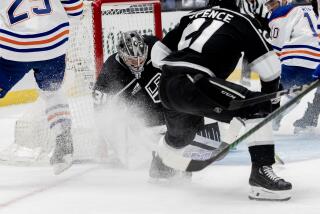A post-concussion Sidney Crosby to hit ice for Pittsburgh Penguins
Sidney Crosby’s planned return to the ice for the Pittsburgh Penguins after 320 days — more than 10 months — has hockey fans fixated on Monday night’s face-off against the New York Islanders.
The National Hockey League’s most valuable player in 2007 has been sidelined for most of the year after sustaining a nasty concussion after two games in January — the first against the Washington Capitals, the second against the Tampa Bay Lightning.
Crosby reportedly suffered from severe migraines — to the point where, for a time, he was unable to drive. A specialist told the New York Times in September that the 24-year-old’s spatial sense had been affected but was improving.
At the time, Crosby said his headaches would still manifest when he was playing at 90% capacity. But, Penguins General Manager Ray Shero said at the time, “He will not return until he is 100%. There is no 90% returning from a concussion.”
Shero’s right about that. A 2000 study of football players published in the American Journal of Sports Medicine found that players who sustain a concussion are three times more likely than their peers to sustain a second one, often because they return to the game before fully healed.
Clearly, concussions aren’t just the domain of football and boxing. Studies abound on the effects of concussion in hockey; in fact, one 2011 study published in the Canadian Medical Assn. Journal tracked concussions sustained by NHL players from 1997 to 2004.
Symptoms varied, including headache, vertigo, loss of balance, memory loss and even change in personality. Players lost between zero and 342 days of activity after being injured. The study also found that in 27% of cases where a potentially injured player kept playing without being medically evaluated during the game, the player lost more than 10 days on average to recovery (a length of time indicating that the brain injury was on the more severe side).
“It is possible that continued exertion in the immediate postconcussion period may exacerbate the injury or increase a player’s susceptibility to further injury, which may ultimately increase severity and prolong recovery,” the study authors explain.
And repeated concussions can have severe and devastating consequences for athletes years, even decades, down the road. It makes Crosby’s absence from the rink to recuperate seem a lot less lengthy.
Follow me on Twitter @LAT_aminakhan.
More to Read
Go beyond the scoreboard
Get the latest on L.A.'s teams in the daily Sports Report newsletter.
You may occasionally receive promotional content from the Los Angeles Times.






